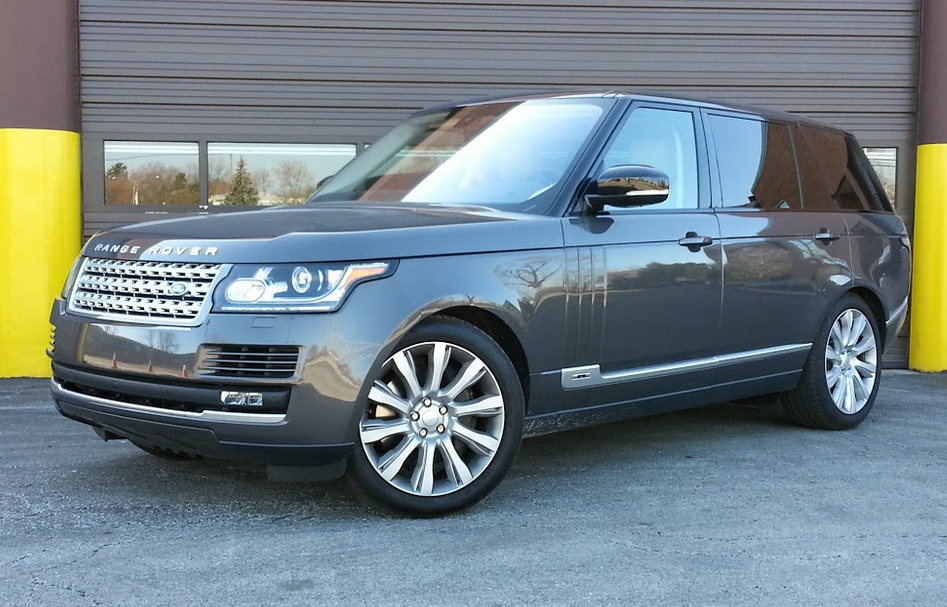
2016 Land Rover Range Rover Supercharged LWB
Class: Premium Large SUV
Miles Driven: 267
Fuel Used: 18.3 gallons
Real-world fuel economy: 14.6 mpg
Driving mix: 75% city, 25% highway
EPA-estimated fuel economy: 14/19/16 (city/highway/combined)
| CG Report Card | |
|---|---|
| Room and Comfort | A |
| Power and Performance | A- |
| Fit and Finish | A |
| Fuel Economy | D+ |
| Value | C+ |
| Report-card grades are derived from a consensus of test-driver evaluations. All grades are versus other vehicles in the same class. Value grade is for specific trim level evaluated, and may not reflect Consumer Guide's impressions of the entire model lineup. | |
| Big & Tall Comfort | |
| Big Guy | A |
| Tall Guy | A |
| Big & Tall comfort ratings are for front seats only. "Big" rating based on male tester weighing approximately 350 pounds, "Tall" rating based on 6'6"-tall male tester. | |
Base price: $108,195 (not including $995 destination charge)
Options on test car: Four-Zone Climate Pack ($2900), Vision Assist Package ($2110), tow package ($1300), Meridian Premium Audio ($1850), special paint ($1800), protection package ($511)
Price as tested: $119,661
Quick Hits
The great: Impeccably luxurious interior trimmings, outstanding acceleration, impressive off-road ability
The good: Long wheelbase body style provides excellent rear-seat legroom, handsome styling inside and out
The not so good: Sky-high base price gets even higher when spendy options are added, thirsty for premium-grade gasoline
More on Range Rover prices and availability
Damon Bell
As the flagship model line in Land Rover’s product roster, the Range Rover offers levels of luxury and capability that few vehicles can match. And Land Rover offers plenty of options within the lineup to help tailor a Range Rover to your needs. Interested in blistering acceleration? Opt for the supercharged 5.0-liter V8, which puts out 510 horsepower in Supercharged models and 550 in the new-for-2016 SVAutobiography. Want better fuel economy and a longer driving range? Select the new-for-2016 3.0-liter turbodiesel V6 engine, which is EPA-rated at 22 mpg city/28 mpg highway. Looking for a bit more rear-seat legroom that the standard Range Rover body offers? Well, you’re in luck there too. The Supercharged and Autobiography trim levels offer long-wheelbase “LWB” variants, and the line-topping SVAutobiography comes exclusively as an LWB.
Our tester was a Supercharged LWB that was decked out with a number of options. The $2900 Four Zone Climate Pack included four-zone climate control (natch); front massaging seats; and power heated/cooled rear seats with power recline, lumbar, and folding functions. That last function has a handy “Intelligent Seat Cargo Mode” feature—the front seats power forward automatically to as not to clash with the folding rear seats. The $2100 Vision Assist Package includes configurable mood lighting, a surround camera system, adaptive xenon headlights, and a blind-spot monitor with closing-vehicle sensing and reverse traffic detection. The $1300 Rover Tow Package adds a hitch receiver with electrical connector, a full-size spare tire, and an active locking rear differential. The $1850 Meridan 825-watt premium audio system includes a leather-wrapped steering wheel, and the Waitomo Grey paint color tacks on another $1800(!).
Test Drive: 2015 Land Rover Range Rover Sport SVR
These options join a pretty healthy list of standard features, such as a power tailgate with hands-free open/close, a power tilt/telescopic heated steering wheel, front/rear parking sensors, panoramic sunroof, and a touchscreen navigation system with voice control and Land Rover’s InControl Apps smartphone integration.
The Range Rover’s standard full-time 4-wheel-drive system is similarly flush with features, including Hill Descent Control; Hill Start Assist; and Land Rover’s Terrain Response 2 system, which includes snow, mud, sand, and rock-crawl settings. There are also standard on-road driving aids such as Dynamic Stability Control, Roll Stability Control, Electronic Brakeforce Distribution, and Cornering Brake Control. All this technology adds up to an SUV that’s more capable and confidence-inspiring both on-road and off-road than most of its competitors.
Note that the 2017 Range Rover line sees a handful of updates, most notably a larger, 10.2-inch touchscreen display; a new SVAutobiography Dynamic model; an Intelligent Speed Limiter that uses traffic-sign recognition technology to automatically match the posted speed limit; an Advanced Tow Assist feature that makes reversing a trailer easier; and Low Traction Launch, a driving mode that assists drivers when pulling away from a stop on slick surfaces such as wet grass or snow.
Test Drive: 2017 Mercedes-Benz GLS450
We didn’t have the chance to do any serious off-roading during our test, but we were able to sample our Range Rover Supercharged LWB in a variety of street-driving conditions. The 510-hp supercharged V8 delivers incredible power pretty much whenever you want it… there are few vehicles of this size and heft that feel as downright quick as a Range Rover Supercharged. And the engine keeps pulling seamlessly until you’re well into extra-legal speeds.
The Range Rover LWB is large, heavy, and tall, but its cornering and handling capabilities are a step above most other premium large SUVs. The extra length of the LWB chassis benefits ride quality; our tester was a bit smoother over bumps and dips than regular-length Range Rovers we’ve driven.
Classy interiors are a Range Rover staple, and our tester didn’t disappoint. Top-notch materials throughout, highlighted by some tasteful satin-metal and high-gloss-wood finishes, make for a genuinely luxurious cabin ambiance. The unusually thick-pile carpet looks nicer than the stuff I have in my basement at home, though I’d worry about getting it dirty—good thing there are heavy rubber floor mats covering the front and rear seating areas and the rear cargo floor.
The downside to all of this, of course, is a price tag that starts at more than $108,000 and goes up quickly from there as the options are added. However, for those few well-heeled shoppers who can truly utilize all of its capabilities, an astutely equipped Range Rover is worth the price.